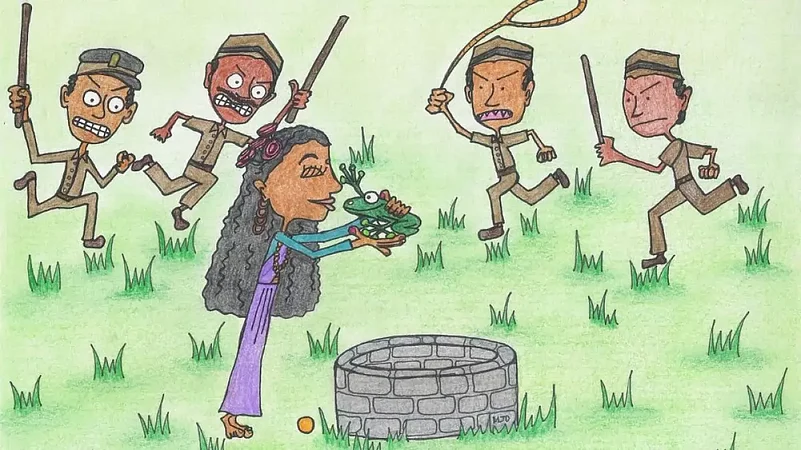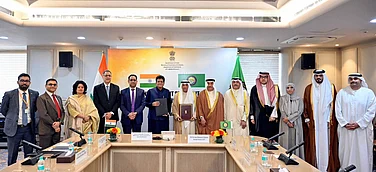Thirty-odd years ago my parents moved to Bangalore from south Kerala. I have no clue what their hopes and dreams were but this much I can say for sure—as Malayalee Ezhavas who wanted to have a better chance at life they really worked hard. My father was very passionate about his work as a draughtsman (a professional who makes detailed technical blueprints or drawings) but with computers taking over, he knew his career was at stake so he started exploring ‘screen printing’. My mother had a degree and type-writing skills, so she had been trained in graphic designing, and they eventually collaborated as entrepreneurs. For me, this brought in a sense of gender equality because both my parents were always working. I happened to my parents in the middle of all this after two years of their marriage. My fathers’ relatives who had settled in Bangalore early on were around as a support system but I barely have any memory of visiting them often. I used to envy my cousins back in Kerala, who lived so close to each other that their houses almost had no boundaries. They had each other in times of need and most importantly, for the ‘child version’ of me, having someone close by who spoke in my native tongue was immeasurably precious.
I did have Malayalee neighbours but we would mostly speak in English because we all went to the same school that propagated the idea that one must stop speaking one’s native tongue to become an expert at English and if you didn’t speak English fluently you’d be looked down upon. I mean, for eight-year-olds it was a bit much, but these were the circumstances in which I had to grow up. I was very conscious of the fact that we were poor (lower middle class), but it never occurred to me that we were from a backward caste until I had to get a Caste Certificate made when I was in 10th or 12th grade so that I could get admission in a better educational institution where I’d have to pay much lower fees or avail other concessions (which never happened because I wasn’t marginalised enough). As a child, I could not see through all the abuse, how capitalism and patriarchy had continued to play their part, but I remember aching like there was no end to the pain.
With the arrival of my brother in my family, the whole dynamic changed and I distinctly remember having symptoms stemming from psychological difficulties that went unaddressed because my parents were not aware that I had behavioural issues that needed attention from mental health professionals. In 10th grade, I finally had access to a therapist at school who I felt was the first person in my entire life to listen to me. Now, as a neuroqueer counselling psychologist, I see my journey and recognise that I survived despite adverse childhood experiences that were influenced by patriarchy, capitalism, casteism and the cultural supremacy English had over us, but it left trauma that I had to deal with in my early adulthood.
Psychiatrist Dr Shyam Bhatt would often talk about mental health-related challenges young Indians were facing on Radio One 94.3 back in 2012. I used to tune in and listen to him, those few minutes were my only hope for a better future. My mother kept telling me how unattractive I was. My father, in ways he wasn’t consciously aware of, reminded me of how useless I was for not being a boy/man. Society kept asking me, “Why I was so lean? Why so short? Why did my teeth stick out? Why was I so bad at Maths, Physics and Chemistry? Why was I not an engineer or a doctor?”
Well, as a twenty-nine-year-old who has been patiently living to find a better future, learning to improve my relational and communication skills while also dealing with depression, C-PTSD (Complex-Post Traumatic Stress Disorder) and anxiety, I know that my body was almost always in survival mode. For most of my childhood, my brain had to protect me from all forms of harm—be it physical, emotional, verbal or sexual—inflicted from within my family or friends circle, and it was excruciatingly painful and exhausting to deal with. Hence my capacity to focus on academics was adversely affected, I didn’t develop enough social skills, my self-esteem was severely low and my chance of survival in this world was dwindling by the minute. After finishing my Master's in Psychology, I remember watching each day pass. I knew I had to choose between leaving my parental home for the better or staying on to suffer. My parents were unwilling to change their value systems which were drastically different from my own, thanks to all the autistic hyper-fixation on reading specific articles and books, watching certain kinds of movies and spending most of my time by myself or with adults. It was so difficult to have a conversation with someone my age because I could barely relate to what they’d say.
I think I developed the ability to connect with humans emotionally where physical appearance didn’t matter because I was never allowed to travel, make friends and find companionship within my age group. The Internet came to my rescue though. I didn’t have access to a smartphone until 2015 so I often didn’t know what the person I was chatting with looked like and this reflected in my dating choices too. This was also around the time I had to face the fact that I have the capacity to love more than one person at the same time. It took me by surprise because I was already in a long-distance relationship with a Malayalee boyfriend my parents would approve of, but I fell in love with someone else I was talking to online. I remember how tormented I felt while deciding not to confess my feelings for the African man I had fallen in love with. I was twenty-two and he was thirty, divorced with two children. If anyone had found out, it would’ve been a scandal and I still remember being slut-shamed by my mother at the age of eighteen because I had boys' names saved in my phone. Since I went to a girls-only school, they were angry at me because I was talking to boys, the very thing they had been trying to avoid.
In 2018, when I first came across a news article on polyamory, little did I know that by 2023 I’d be living with two queer folx and a cat in the same household as a family (although we may not be legally recognised as one). We share finances, household chores, support each other emotionally and honestly, I couldn’t have asked for a better family than this. It’s a beautiful little queer-platonic family. We occasionally have other queer folx come to stay with us in times of need and distress. The real sense of family, community care and partnership is something I have been able to learn and exercise in this space. We are aware of our challenges, differences, dreams and hopes for the future and try to be there for each other. We’d all grown up in households that didn’t know how to resolve conflicts effectively with non-violent means of communication, so exercising it in this space for the first time with other like-minded individuals has been exhilarating.
My flatmates and I may not be romantic or sexual partners, but we share a unique platonic companionship while also encouraging each other to pursue any romantic/sexual interests we may have. I have dreamt of having a ‘kitchen table polyamorous’ dynamic but I always felt it would be impossible because how do you find platonic/romantic/sexual partners who are compatible and willing to live under the same roof? To me, in some form, I already feel like I have the family I needed. This need sprung up from my thoughts associated with how my childhood would’ve been much more bearable if I had more than two parents. When my parents were working hard day and night, they could barely show up for me. My mother would be mentally and emotionally exhausted from all the household chores and office work and of course, she could have used some help. It truly takes a village to bring up kids but that wasn’t part of the idea of a typical nuclear family back in the 2000s. I often felt that if my parents had access to better resources, I would have had a safe space to talk about my experience of sexual abuse and bullying that I faced in school. I remember feeling suicidal when I was an eight-year-old and I’ve lived with depression for so long that depression and anxiety have been my partners in life.
So where do new relationships or relational styles emerge from? To me, it was my pursuit of love that led me to polyamory and relationship anarchy—a way of approaching relationships that rejects any rules and expectations other than those set by the people involved in the relationship; the core values being autonomy, anti-hierarchical practices, anti-normativity and community interdependence.
All of us have been conditioned to be allonormative (an assumption that all human beings experience sexual attraction to other people) and amatonormative (the assumption that all human beings pursue love, especially by means of a monogamous long-term relationship). ‘Compulsory monogamy’, whether in a queer or heterosexual partnership, has hugely limited our ability to support each other within the community. It breeds hostility and selfish ways of being yet, we blindly practice it because patriarchy and capitalism benefit from enabling endogamy and monogamy.
As a teenager, I did dream of being married, having a baby before I turned thirty and working as an assistant professor pursuing my PhD. Somehow, here I am at twenty-nine, actually exploring my dreams that aren’t tainted by the expectations of society. I walked away from societal norms well-aware of the so-called ‘consequences’. My journey began by exploring my love for the women in my life (I was bi-curious) and as I started exploring the concept of gender, simultaneously I transitioned from being gender non-conforming to genderfluid, non-binary and transgender. I remember telling myself that it was time to give myself permission to live my life with less fear, more hope and love. Over the last 2-3 years, I figured I was polyamorous and wanted to practise relationship anarchy because my sexual attraction towards humans was changing drastically. From my mid-teen years until my early twenties, I was attracted towards men because that was the norm. In my early twenties, I remember feeling heartbroken whenever my relationship with a female friend came to an end. The pain wasn’t any less than what you experience when a romantic relationship ends.
I knew that I had to feel a sense of safety and emotional connection to develop any form of sexual attraction towards another person, and as a demisexual, it didn’t occur to me until I was twenty-five that I was asexual and reciprosexual (someone who doesn’t experience sexual attraction unless they know that the other person is sexually attracted to them first). It was just mind-numbing that men almost always assumed I was sexually attracted to or interested in them when all I sought was companionship, hence, I had faced multiple instances of sexual harassment and assault. Over time, my boundaries grew stronger; I learnt to assert them by embodying my masculine and feminine selves. And I was able to show up as my authentic self. Caste and class fit into these relational structures in a very tricky manner. After I left my parental home, every call from home was about my marriage or my job. I had quit my teaching job right before the pandemic and finding a new job that would accommodate for my psycho-social disabilities due to mental illnesses was a challenge. I wasn’t worthy somehow if I wasn’t in a position to financially support my family. They’d say, “Get married to someone abroad and go pursue your Masters or PhD.” While it may sound like a great idea, how was I to find a person who aligned with my values, where our future goals and expectations matched? It was not intelligible to my parents that I’d rather explore relations my way than comply with societal norms.
This required me to take on what life had to offer which was mostly solitude and loneliness. I had to actively seek companionship mostly through dating apps, individual therapy, community care from group therapy spaces and romantic relationships which often ended in 2–4 months. Then there was the never-ending cycle of reaching out for emotional support to repair the damage caused by the break-up of not just romantic but also platonic relationships that I had deeply invested in. My love for people wasn’t limited just to my romantic or sexual partners. As a panromantic asexual, I soon realised how people don’t perceive the care and attention I lavish on them on my terms because they are allosexuals (people who experience sexual attraction towards others). In most cases, I don’t even experience sexual attraction let alone desire a sexual relationship. It is unfathomable to people that I may not experience sexual attraction yet, I am kinky and I’ve been exploring shibari (rope bondage; BDSM) for the past few years.
As a therapist with a neuroqueer, feminist, anti-oppressive, anti-caste, trauma-informed lens through which I view the world; I do introduce new concepts and ideas of various relational styles, resources and tools to help my clients who practise non-traditional styles of relating to fellow humans. I have seen queer-platonic relationships thrive, young couples questioning if their attraction for others outside their closed relationship is infatuation that will fade over time or if they are genuine feelings. Couples taking a break to work on themselves and coming back to each other with more compassion and better relational skills. Often with a better understanding of themselves, their needs and by identifying how their childhood experiences and associated trauma play out in their adult lives, they are better equipped to love all parts of themselves and also to receive love from other relational spaces. I see how more women, non-binary and trans individuals come in for therapy over men. A deep sense of helplessness emerges when male counterparts are unwilling to work on their emotional and spiritual selves. The strongest form of emotional connection I have sensed in my relationships with men is when I see they are as human as I am, and that is mostly when they allow themselves to feel vulnerable—it is poignant yet a profound experience to share, one that nurtures love. In our effort to dismantle and disintegrate oppressive systems and structures, we struggle with resistance and acceptance of our lived realities. Yet, in the middle of all this, let’s make time for love.
(Views expressed are personal)
Nidhra Purrple Sin Elai is a counselling psychologist, drag performer, visual artist and dancer

















